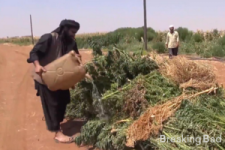Madre
PR manager
- Joined
- Sep 6, 2022
- Messages
- 58
- Reaction score
- 152
- Points
- 33
Afghanistan is one of the largest cannabis producers in the world, and according to the United Nations, it became the main producer in 2010. The country has a long history of producing opium and cannabis, with large-scale cultivation in almost half of its provinces. The illegal cannabis trade is believed to have fueled militancy in the country before the Taliban took office in 2021.
The Taliban, known for their strict interpretation of Sharia law and their harsh treatment of those who violate it, seem to be experiencing some confusion when it comes to their stance on cannabis. In a series of events that have left many scratching their heads, the Taliban have both announced a deal to grow and manufacture cannabis products in Afghanistan and enacted a law banning its cultivation.
In November of 2021, the Taliban announced a deal with a German company called Cpharm to establish a cannabis production factory in the country. The deal was said to be worth more than $400 million and would create jobs for many citizens. The Taliban even took to social media to announce the deal, but it wasn't long before things got confusing.

Regional media organizations reported that an Australian company called Cpharm was involved in the deal, which prompted the firm to release a statement denying any involvement. The Taliban spokesperson later clarified that the deal was indeed with a German company also called Cpharm. It was a case of mistaken identity, it seemed, but it didn't stop the confusion.
The deal seemed particularly unusual given the Taliban's harsh treatment of drug consumers and their previous ban on opium production. However, reports suggest that marijuana served as a major source of revenue for the Taliban during the US occupation, and now they seem to see economic opportunities again, but through a more professional, regulated market.
Fast forward to March 2023, when the Taliban have passed a law banning the cultivation of cannabis and hemp across Afghanistan. The new decree strictly prohibits the planting of cannabis plants, and anyone who violates this order will face complete destruction of their crops and punishment according to Sharia law.

The deal with Cpharm could have had a significant impact on the country's economy, providing job opportunities for hundreds of citizens. Still, the regime's recent announcement has left many farmers uncertain about their future, as cannabis and hemp are essential crops for their livelihood. It's unclear what the Taliban plans to do to support farmers or if they have any alternative crops to offer.
The Taliban, known for their strict interpretation of Sharia law and their harsh treatment of those who violate it, seem to be experiencing some confusion when it comes to their stance on cannabis. In a series of events that have left many scratching their heads, the Taliban have both announced a deal to grow and manufacture cannabis products in Afghanistan and enacted a law banning its cultivation.
In November of 2021, the Taliban announced a deal with a German company called Cpharm to establish a cannabis production factory in the country. The deal was said to be worth more than $400 million and would create jobs for many citizens. The Taliban even took to social media to announce the deal, but it wasn't long before things got confusing.
Regional media organizations reported that an Australian company called Cpharm was involved in the deal, which prompted the firm to release a statement denying any involvement. The Taliban spokesperson later clarified that the deal was indeed with a German company also called Cpharm. It was a case of mistaken identity, it seemed, but it didn't stop the confusion.
The deal seemed particularly unusual given the Taliban's harsh treatment of drug consumers and their previous ban on opium production. However, reports suggest that marijuana served as a major source of revenue for the Taliban during the US occupation, and now they seem to see economic opportunities again, but through a more professional, regulated market.
Fast forward to March 2023, when the Taliban have passed a law banning the cultivation of cannabis and hemp across Afghanistan. The new decree strictly prohibits the planting of cannabis plants, and anyone who violates this order will face complete destruction of their crops and punishment according to Sharia law.
The deal with Cpharm could have had a significant impact on the country's economy, providing job opportunities for hundreds of citizens. Still, the regime's recent announcement has left many farmers uncertain about their future, as cannabis and hemp are essential crops for their livelihood. It's unclear what the Taliban plans to do to support farmers or if they have any alternative crops to offer.
While the world is steadily moving towards the legalization of cannabis,
certain countries are still trying to resist.
Let's see how long they can resist the global world trend,
because there's a lot of money at stake.
certain countries are still trying to resist.
Let's see how long they can resist the global world trend,
because there's a lot of money at stake.

